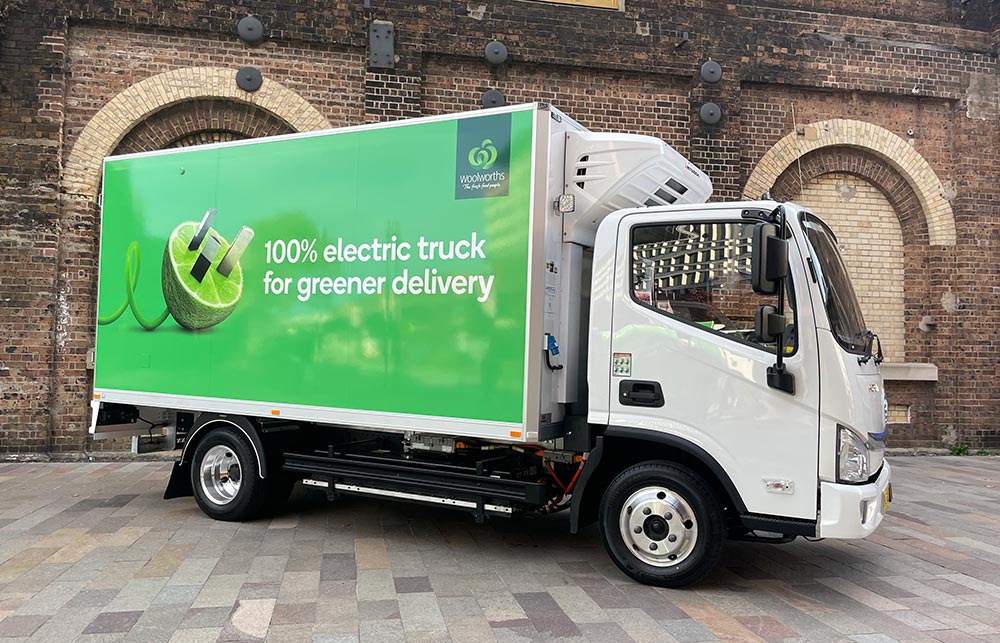June 10, 2023 • By Neil Dowling • News, Trucks Foton, T5 EV, Woolworths –––––
EV trucks help grocer slash emissions by 60% from 2030 and net zero by 2050
WOOLWORTHS will run its entire operations across Australia and New Zealand on renewable electricity in 2025 and by 2030, hopes to have an all-electric home-delivery truck fleet of more than 1200 vehicles.
By 2030, Woolworths intends to have reduced its overall operational transport emissions by around 60 per cent compared to today, and to have decomissioned more than 3000 internal-combustion engine vehicles from its company-wide fleet.
The latest step in this transition was the launch into service this week of 25 Foton T5 EV trucks in what the retailer said was “an initial order.” Woolworths said the current fleet has more than 1200 trucks and all are planned to be replaced with EV models,
The Fotons will join two SAIC EV trucks and begin delivering groceries to Woolworths’ Sydney customers over the next two months.
The Foton and SAIC trucks have sufficient range to complete metro home deliveries. They each have a new, state-of-the-art electric refrigeration system that runs off the vehicle’s battery, ensuring groceries stay cold.
In addition to the home-delivery trucks, Woolworths is currently operating three electric heavy-rigid vehicles as it trials emerging technology to help decarbonise its fleet in the long-term.
The heavy-rigid trucks deliver groceries from distribution centres to Woolworths supermarkets in Sydney and Melbourne.
The company also has trucks with an e-axle trailer, which uses kinetic energy produced by the trailer’s turning wheels and axle to feed electricity into the on‑board battery for the trailer’s refrigeration system.
Woolworths said that a single trailer is estimated to save over 5000 litres of fuel or 14 tonnes of CO2 annually.

The company said that at present, the technology and infrastructure to support the load intensity and distances of long-haul freight is still in its infancy.
“Woolworths Group also hopes to contribute to public infrastructure planning to ensure the right charging technology and locations are considered to meet the needs of electric metro fleets, as well as low emissions long-haul freighter trucks which will require accessible recharging points across regional Australia,” the company said.
All 27 of the new home delivery EVs will be based in Sydney, delivering groceries to customers across the CBD, Inner West, Sutherland Shire, St George region and Eastern Suburbs.
Woolworths said that currently, public EV infrastructure to support commercial fleets “remains limited.”
The EV trucks will operate out of Woolworths’ Customer Fulfilment Centres (CFC) in Mascot and Caringbah, which are dedicated to picking and packing the supermarket’s online orders. The CFCs have installed new EV charging infrastructure in preparation.
Woolworths said the home delivery fleet is currently made up of 1200 trucks but was growing. It said that the last combustion-engine vehicle will join the home delivery fleet by 2027, as they are gradually decommissioned and replaced with EVs.
Woolworths Group CEO, Brad Banducci said in a statement: “Our home delivery trucks are a familiar sight in neighbourhoods across Australia, and within the next seven years, we want to make every one of them electric, and free of fossil fuels.
“The case for a low carbon future has never been clearer and we’re backing a better tomorrow for our communities and the planet by starting the transition now.
“We’re proud to be putting 27 new EVs on the road in the coming weeks – in one of the many ways we’re working to make grocery shopping greener.
“Not only can we help make our suburban streets quieter and cleaner, but we hope to set an example for other businesses to support the growth of Australia’s EV industry.”
Foton Mobility Distribution CEO Neil Wang said the T5 fitted neatly within Woolworths’ stated intent to decarbonise its transport and logistics operation by working collaboratively with its suppliers and partners to deliver on its sustainability agenda.
“Exploring zero emissions transport opportunities within their value chain is an important component of that collaboration,” he said.
Mr Wang said Foton was proud to be associated with Woolworths and to be able to partner with other proven Australian companies such as QTRS, TRS and NTI to deliver first class outcomes for both Woolworths and its customers.
The Foton T5 4.5-tonne GVM can be driven on a car licence, is backed by a nationwide dealer and service network and has “thousands of kilometres of proven global performance during its development” which Mr Wang said made it the ideal vehicle for the last-mile logistics industry.
“With a five-year, 200,000km warranty, Foton Mobility has every confidence that this initial Woolworths order of 25 T5’s will encourage others in the transport and logistics sector to support companies who want to accelerate their own transmission towards ‘net zero’,” he said.